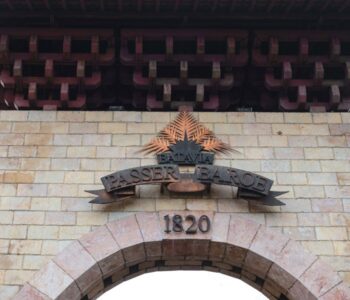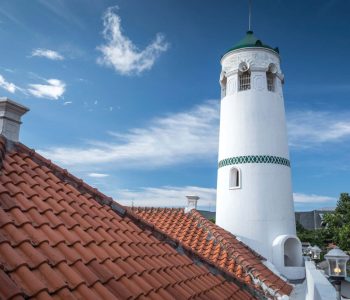History & Heritage
Bubur Ase: A Special Betawi Porridge
At the beginning of the 20th century, bubur ase was a popular food among Batavia residences and was a mainstay for Betawi society. A bowl of this special rice porridge, full of nutritious condiments, warmed stomachs and provided sustenance for the day. Other than being a favourite breakfast meal, the dish is an example of

Pasar Baru: Jakarta’s Historic Shopping Arcade
Specifically built by the Dutch Colonial government to accommodate the shopping cravings of European and Dutch elites in Batavia, Pasar Baru — or Passer Baroe, as it was called then — became a melting pot of communities and ethnicities, from Chinese, Indians, Europeans, and even Malays. Considered the city’s oldest shopping arcade, Pasar Baru continues

Gambang Kromong: Cultural Acculturation in Traditional Betawi Music
A merging of a Javanese and Sundanese gamelan orchestra, Gambang Kromong has a unique sound and distinct timbre. This comes from the various music instruments originating from the acculturation of Indonesian and Chinese traditional music. A synergistic relationship between ethnicities will produce a beautiful harmony in life. That’s the moral that can be taken from

Pekojan: Jakarta’s Historic Arab Village
Pekojan is a historic district or kecamatan in West Jakarta. Considered the city’s original Arab village, it is a prime example of the rich ethnic diversity found in Jakarta and how different communities created their own landmarks and cultural treasures over time. Back when Jakarta was still under Dutch colonial rule, known at the time

Bir Pletok: Betawi’s Distinctive Herbal Drink
Despite the name bir (pronounced: beer), this drink contains no alcohol at all. It’s made from a mixture of spices and the Betawi people consider it a wellness drink, even though it was created under the influence of the Dutch culture of drinking alcohol during the colonial era. Bir Pletok is the star of Betawi

Rode Winkel: The Transformation of Toko Merah
After a long period of closure, Toko Merah is now open with its new name Rode Winkel, providing a vibrant way to stroll through its rich history while savouring good drinks and sumptuous food. Since its construction in 1730, the historic building named Toko Merah has changed ownership several times, from the VOC, Chinese civilians,

Kampung Tugu: Portuguese Traces in North Jakarta
Jakarta is widely known as a multi-ethnic city. Yet, not many people know that on the east of Tanjung Priok harbour lies a village inhabited by people of Portuguese descent who still preserve their culture and heritage. It is from this old village where keroncong music and gado-gado originated. On my way to Rumah Tugu

Belanda Depok: The History of the ‘Depok Dutch’
‘Belanda Depok’ was once a pejorative, or mocking name, given to the old communities of Depok, a region found between Jakarta and Bogor, now best known as the home of The University of Indonesia. The origin of this term, meaning ‘Depok Dutch’, spans back to the early days of the Dutch colonisation of Indonesia and is an

Unique Stories Behind Indonesia’s Independence Day
The Proclamation of Indonesia’s Independence was read directly by Soekarno, accompanied by Mohammad Hatta, on 17 August 1945 at Jalan Pegangsaan Timur Number 56, Jakarta, at exactly 10am during the month of Ramadan 1366 H. While that moment itself is considered almost sacred by the Indonesian population, it was in many ways just the culmination

Historical Sites of Indonesia’s Independence in Jakarta
17 August 1945 was a sacred day for Indonesians: a declaration of independence, a rejection of colonialism. It was a long journey for the nation to achieve independence and in fact it continued to 1949, when the Dutch finally ‘accepted’ the nation’s sovereignty. Here are the historical sites of Indonesia’s Independence in Jakarta, the landmarks

Tumpeng Philosophy (and why we’ve been doing it all wrong)
Nasi tumpeng is iconic when it comes to Indonesia’s traditional celebratory cuisine. It has come to represent Indonesian culture and way of life through its variety of ingredients, colours, shape and its ‘serving’ tradition. Seen at birthdays, anniversaries, business openings, weddings, it is ubiquitous with celebration, but despite how commonplace it is, it turns out

Sunda Kelapa and the Birth of Jakarta
All data and history point to the area of Kota, on the west bank of the Ciliwung River approximately eight hundred meters south of the Pasar Ikan. There, the seeds were planted that developed into the metropolitan city of Jakarta Raya, one might say the birth of Jakarta, a city which is now home to

Betawi Culture, in a Nutshell
In light of the 494th Anniversary of Jakarta, it seems only fitting that we explore the very essence of what makes the capital ‘Jakarta’, with its plethora of cultures merging, and its history that’s rich with pride and struggle, the Betawi culture carries centuries of continuous amalgamation and union, birthing traditions and costumes that are

